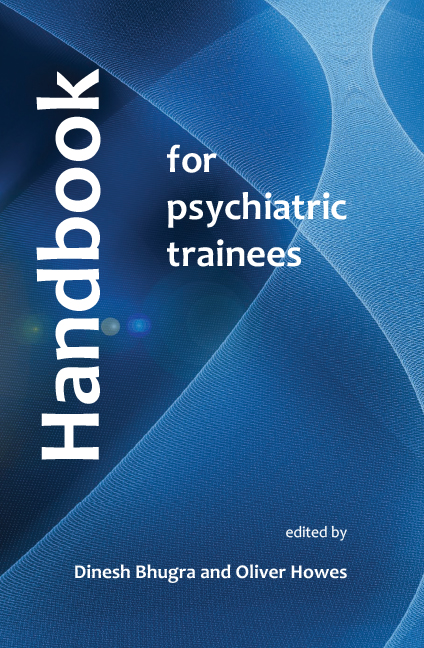Book contents
- Frontmatter
- Contents
- List of tables, boxes and figures
- List of contributors
- 1 Psychiatric training: the next steps
- Part 1
- Part 2
- Part 3
- 14 Personal safety
- 15 Managing violence
- 16 Managing difficult clinical situations
- 17 Understanding and managing stress
- 18 Managing time: the key to professional success
- 19 Negotiation skills
- 20 Presentation skills
- 21 Mental health review tribunals: reports and hearings
- 22 How to get published
- 23 Mental health informatics
- 24 Clinical governance
- 25 Lifelong learning and revalidation
- 26 Mentoring and shadowing
- 27 The MRCPsych examinations
- 28 Flexible training
- 29 UK training for overseas doctors and opportunities for UK doctors to train outside the EEC
- 30 Academic careers
- 31 Higher degrees
- Index
26 - Mentoring and shadowing
from Part 3
- Frontmatter
- Contents
- List of tables, boxes and figures
- List of contributors
- 1 Psychiatric training: the next steps
- Part 1
- Part 2
- Part 3
- 14 Personal safety
- 15 Managing violence
- 16 Managing difficult clinical situations
- 17 Understanding and managing stress
- 18 Managing time: the key to professional success
- 19 Negotiation skills
- 20 Presentation skills
- 21 Mental health review tribunals: reports and hearings
- 22 How to get published
- 23 Mental health informatics
- 24 Clinical governance
- 25 Lifelong learning and revalidation
- 26 Mentoring and shadowing
- 27 The MRCPsych examinations
- 28 Flexible training
- 29 UK training for overseas doctors and opportunities for UK doctors to train outside the EEC
- 30 Academic careers
- 31 Higher degrees
- Index
Summary
This chapter sets out how mentoring can be used as a tool to support continuing personal and professional development. The concept of mentoring is particularly relevant in the development of staff in a multicultural workforce such as the National Health Service (NHS). There can be significant difference in career progression between Whites workers and those from other racial groups, and mentoring can reduce the negative career progression and enhance conditions that foster the upward mobility of professionals from Black and minority ethnic groups (Thomas, 2001). We also consider how shadowing can provide an opportunity to gain a broad overview of organisational structures and understanding of management roles in complex organisations such as the NHS.
What is mentoring?
Mentoring can be said to have a long history. Odysseus asked his friend Mentor to guide his son'sdevelopment while he was away fighting the Trojan War. Mentoring is broadly defined as the process by which one person (the mentor) actively encourages the development of another person (the mentee) outside the normal line-management relationship, for the benefit of both individuals (and the organisation for which they work). The mentor guides, supports and enables the mentee to grow and develop in a role and in their career. Both parties benefit from the relationship.
A good mentoring relationship is one in which the mentor and mentee enjoy a mutual respect and value the joint opportunities for personal development.
Peer mentoring is a variation of mentoring. It is different because both people take on the mentor/mentee roles, as they are peers or colleagues or friends.
A mentoring relationship lasts until the mentee has achieved all the goals set within it: most continue for about 1 year.
The role of the mentor
A mentor:
• has a mentee
• treats that person as an equal
• promotes the mentee'sself-learning and development
• is willing to learn from the mentee
• is committed to development
• is an active listener
• provides positive and constructive feedback
• is willing to share learning and experience
• encourages the mentee to explore different options
• challenges the mentee to think differently.
- Type
- Chapter
- Information
- Handbook for Psychiatric Trainees , pp. 257 - 272Publisher: Royal College of PsychiatristsPrint publication year: 2008



